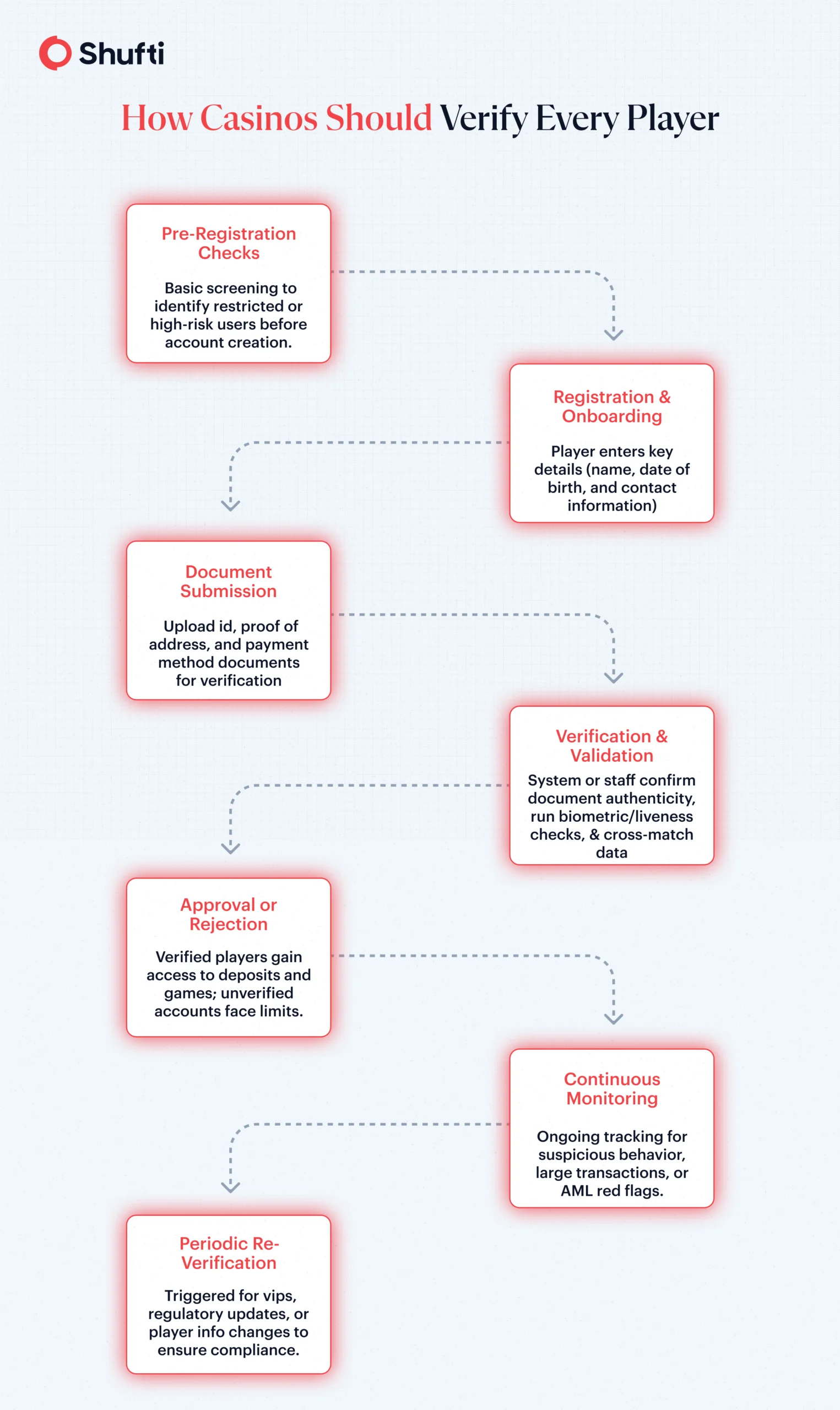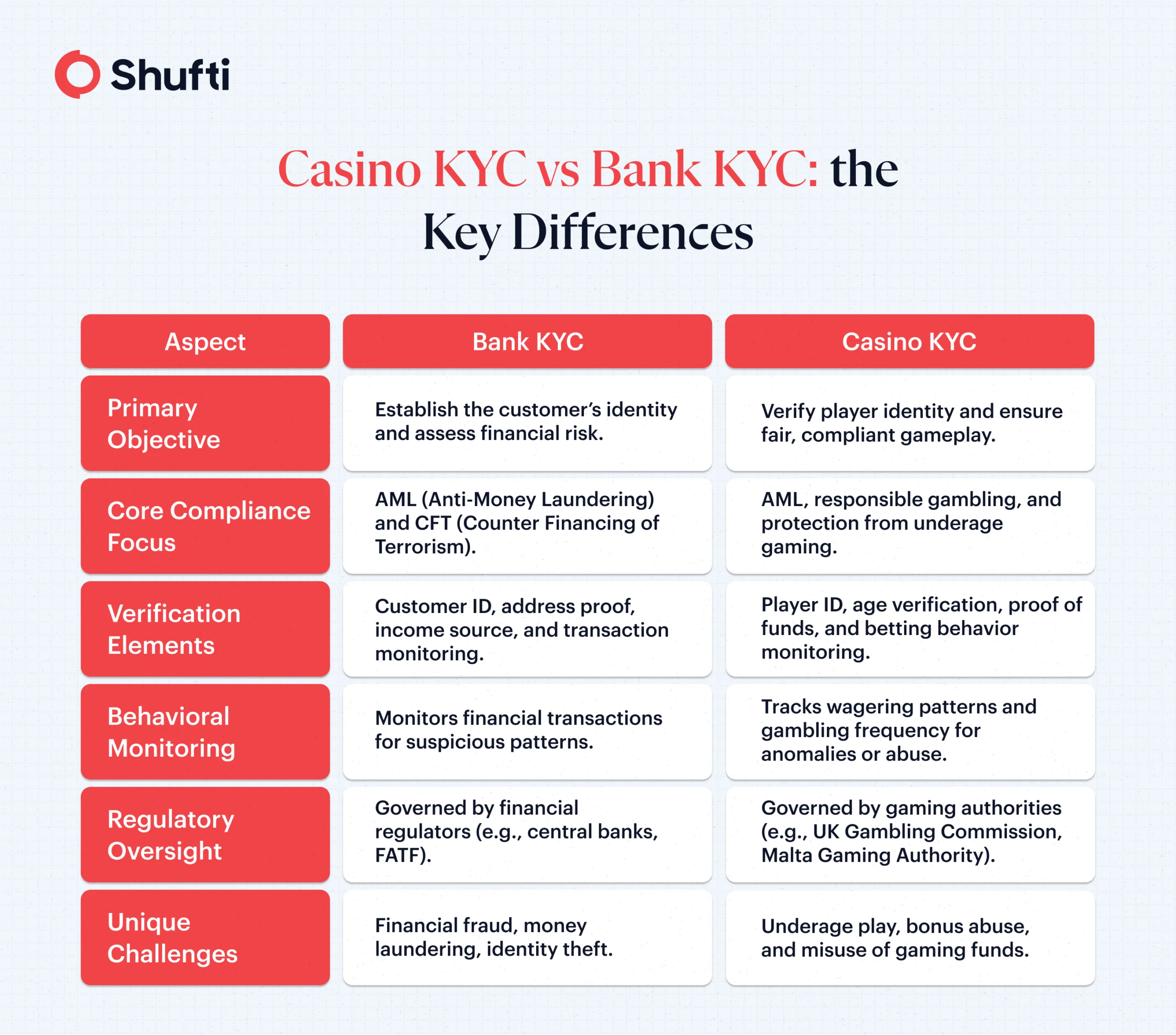Explaining the 3 R’s of KYC in Casino: Risks, Requirements, Regulations

- 01 What is Casino KYC, and Why Does It Matter?
- 02 The First R’ Risk: Why Strong KYC For Casinos Is Non-Negotiable
- 03 The 2nd R’ Casino KYC Requirements: What Operators Must Collect & Verify
- 04 The Third R’— Regulations That Govern KYC For Casino
- 05 The Step-by-Step Workflow For the Casino Verification Process to Authenticate Players
- 06 How Common Schemes Are Fueling the Rise of Online Gambling Fraud?
- 07 How Shortcomings in Online Gambling Verification Lead to Non-Compliance?
- 08 How Casino KYC Differs from Traditional Bank KYC?
- 09 How Shufti Secures and Streamlines KYC For Casinos?
|
Did you know? Lithuania’s Gaming Supervisory Authority (LPT) recently slapped a leading European casino operator with a heavy fine of €8.4 million, a significant penalty. |
This has revealed serious compliance lapses and shows how weak KYC and verification systems can allow illicit money to flow undetected.
The fine against that Casino is more than a headline in 2025; it’s actually a wake-up call for the entire online gambling industry to uphold KYC in casinos.
The root of this incident is a structural problem, namely the failure of Know Your Customer (KYC) controls within a sector already vulnerable to high financial risk. This case is to be discussed later, but it demonstrates that casinos should be prepared immediately to meet the requirements of the jurisdiction in which they operate and enhance their KYC practices to prevent these fines.
For Casinos, integrating the stringent identity verification, along with rigorous monitoring of transactions and fraud detection, is essential for compliance with KYC and AML regulations.
Here are some insights into casino KYC requirements, the online casino verification process for new customers, and the growing importance of KYC verification in detecting fraud before it happens.
But before diving deep. Let’s start with the basics. So, exactly:
What is Casino KYC, and Why Does It Matter?
Basically, it is a systematic process through which casinos verify the identity and age of the player. It also determines their financial legitimacy before allowing them to deposit, wager, or withdraw funds.
Caino KYC is necessary for compliance with anti-money laundering (AML) laws. It also prevents underage gambling and ensures compliance with gambling-specific regulatory requirements.
Unlike traditional financial KYC employed by banks, the Know Your Customer for casinos must take into account not only individual identity checks but also factors such as gambling patterns, breach of betting limits, and the origins of funds. This comprehensive approach enables casinos to effectively identify risky or suspicious activities in real time.
The First R’ Risk: Why Strong KYC For Casinos Is Non-Negotiable
Risk in casinos, whether online or physical, does not start with gameplay; it begins with failing to verify the players. Casinos often fail to conduct comprehensive player identity verification before onboarding, which can create vulnerabilities in their security systems.
The weak authentication procedures put casinos at great risk of losing money and their reputations because fraudsters are all around them. Such problems may cause legal complications and investigations by the regulatory bodies, which may also attract significant penalties.
Evidently, as exhibited in the case of the casino based in Lithuania, which was fined € 8.4 million, investigations into a former investment manager led to accusations of embezzling millions of funds from a funding firm to finance his gambling ventures. The Lithuanian Gaming Supervisory Authority (LPT) detected that the casino failed to implement appropriate KYC and monitoring measures, which permitted large and unregulated deposits. Such a breach allowed financial misconduct that contravened services and revealed critical compliance issues that resulted in serious fines and preserved reputations.
Beyond the financial losses, poor verification erodes player trust and damages a brand’s credibility, often irreparably, as witnessed in this case.
Casinos must adhere to compliance regulations and ensure they gather all necessary information for the Know Your Customer (KYC) process. This brings us to the second “R” of KYC verification in casinos: the requirements.
The 2nd R’ Casino KYC Requirements: What Operators Must Collect & Verify
Casinos need strong KYC (Know Your Customer) rules to stay within legal requirements and prevent fraudulent activities. The case under discussion emphasizes the necessity of improved identity checks in casinos. The regulators react severely towards such failures by imposing multi-million-euro fines, suspension of licenses, or full revocation. Effective KYC processes help casinos comply with the law and win the trust of players and the government by demonstrating transparency and responsibility.
An effective KYC practice will guarantee that all transactions have a valid origin and that all participants will adhere to the local and ethical criteria. Thus, there are certain requirements:
- Identity Verification: Government ID, selfie checks, or biometric validation.
- Proof of Address: Confirming residential legitimacy.
- Source of Funds/Wealth: Assessing money origins, especially for customers coming from high-risk regions.
- Age Verification: Preventing underage gambling.
- Geolocation/IP Checks: Confirming legal jurisdiction.
- Ongoing Monitoring: Continuous, risk-based player reviews.
The Third R’— Regulations That Govern KYC For Casino
Casinos belong to the Designated Non-Financial Businesses and Professions (DNFBPs) and are subject to anti-money laundering (AML) regulations. Nevertheless, their Know Your Customer (KYC) obligations extend further than money laundering prevention. Other casino KYC policies include age verification of players, encouraging responsible gambling behaviors, and safeguarding individuals with a high risk of being “individuals at risk of gambling addiction or financial distress.
The Financial Action Task Force (FATF) sets global standards. National regulators then adjust these standards in their own laws. Following these rules ensures transparency and fairness, and it helps land-based and online casinos operate sustainably.
Key Casino KYC Regulations:
- FATF Recommendations (Global Standard): Casinos must implement Customer Due Diligence (CDD), also identify beneficial owners, and apply a risk-based approach.
- United States (FinCEN / BSA): Casinos are defined as financial institutions under the Bank Secrecy Act that require AML programs, Suspicious Activity Reports (SARs), and recordkeeping.
- United Kingdom (UK Gambling Commission): Remote operators must verify age and identity before gambling, which ensures no deposits or play occur until verification. Enhanced “financial vulnerability and risk” checks are being phased in by February 2025.
- European Union (AMLD / AMLR): Gambling providers are “obliged entities.” CDD is mandatory at thresholds ≥ €2,000, triggered by wagering or payout. Risk-based assessment and ongoing monitoring are also required.
- Asia-Pacific (FATF-APG & Regional AML Laws): Jurisdictions like Singapore, Macau, and Australia enforce casino-specific CDD, transaction reporting, and player verification to deter financial crime and promote responsible play.
The three R’s (Risks, Requirements, Regulations) are essential to stay adherent to the trends and emerging technology. However, understanding the process and how it is done is as crucial.
The Step-by-Step Workflow For the Casino Verification Process to Authenticate Players
The online casino verification process ensures the verification of legitimate players in a systematic manner. The process is not followed by most casinos, but rather by those that comply with regulations. Both land-based casinos and iGaming platforms follow similar verification steps, though online platforms rely more heavily on digital tools and automation, as remote verification is much riskier than in-person verification. The land-based casinos rely on in-person document checks, and iGaming platforms use automated digital verification systems. The optimal workflow is shown in the figure below:

How Common Schemes Are Fueling the Rise of Online Gambling Fraud?
The rise of online gambling fraud has given rise to robust requirements for gambling KYC practices. Fraudsters nowadays are experts in exploiting weak verification systems through multi-accounting, as well as other methods such as bonus abuse. They also employ identity theft and friendly fraud, which is often sourced by using stolen data or duplicate profiles. Several offenders take advantage of gambling sites to launder illegal money through apparently valid bets and withdrawals.
Deepfakes and synthetic identities, along with device spoofing, are advanced threats that even the most advanced verification systems are not capable of detecting and stopping without the use of advanced AI-driven fraud detection and biometric verification systems.
The rise of “no KYC casinos” in online gambling poses major risks, including untraceable financial crimes and data breaches. Such unregulated platforms often facilitate illicit activities and expose players to legal and financial vulnerabilities. In contrast, licensed land-based and online casinos that implement robust KYC verification maintain compliance, prevent fraud, and ensure operational integrity across the gambling ecosystem.
How Shortcomings in Online Gambling Verification Lead to Non-Compliance?
Many critical compliance elements, such as affiliate onboarding and source-of-funds checks, are often overlooked. This lack of awareness allows people to participate without proper checks. Affiliate networks are a major part of this process, yet the failure to check the user properly may result in the admission of an unverified or high-risk player. This is further complicated by the rise of crypto gambling, which complicates tracking transactions and enforcing anti-money laundering regulations.
Meanwhile, the human factor of KYC is also important, as system reliability largely depends on the quality and consistency of staff training and the balance between automated screening and manual case review. Lastly, post-verification segmentation enables casinos to use verified KYC data to personalize safer gambling limits and tools for each player.
How Casino KYC Differs from Traditional Bank KYC?
Both bank KYC and casino KYC serve the core purpose of verifying identities and preventing financial crime. However, there can be certain differences in focus areas and compliance priorities.

How Shufti Secures and Streamlines KYC For Casinos?
As a comprehensive end-to-end compliance solution, Shufti enables casinos to fulfil all regulatory and security requirements, such as KYC for AML compliance and fraud prevention, along with age verification for remote iGaming onboarding.
Shufti offers an easy-to-use Know Your Customer verification system for online and land-based casinos. It combines convenience for users with strong compliance with regulations.
Its AI-powered identity verification, document authentication, and biometric checks enable operators to verify players, which helps in minimizing onboarding friction instantly.
Through features like liveness detection and age verification, it ensures full AML and responsible gambling compliance.
With global coverage and rapid verification, casinos can onboard legitimate players faster. Along with this, they can prevent fraud and meet multi-jurisdictional KYC obligations effortlessly.
Frequently Asked Questions
What is online casino verification?
Online casino verification is the process that gambling platforms use to confirm a player’s identity, age, and payment details through KYC and AML checks. It helps prevent fraud, underage gambling, and money laundering while ensuring compliance with gaming laws and maintaining a secure, trustworthy platform.
What documents do I need to provide for casino KYC?
You’ll need a valid government-issued ID, proof of address, and sometimes source-of-funds documents to verify your identity and eligibility.
How long will casino verification take?
Casino verification usually takes a few minutes to a few hours, depending on the automation level and the accuracy of the submitted identity and address documents.
Should I ever use casinos that don’t have KYC?
No. “No KYC casinos” often operate unregulated, risking fraud, money laundering exposure, and withheld winnings. Always choose licensed platforms with proper verification processes.










